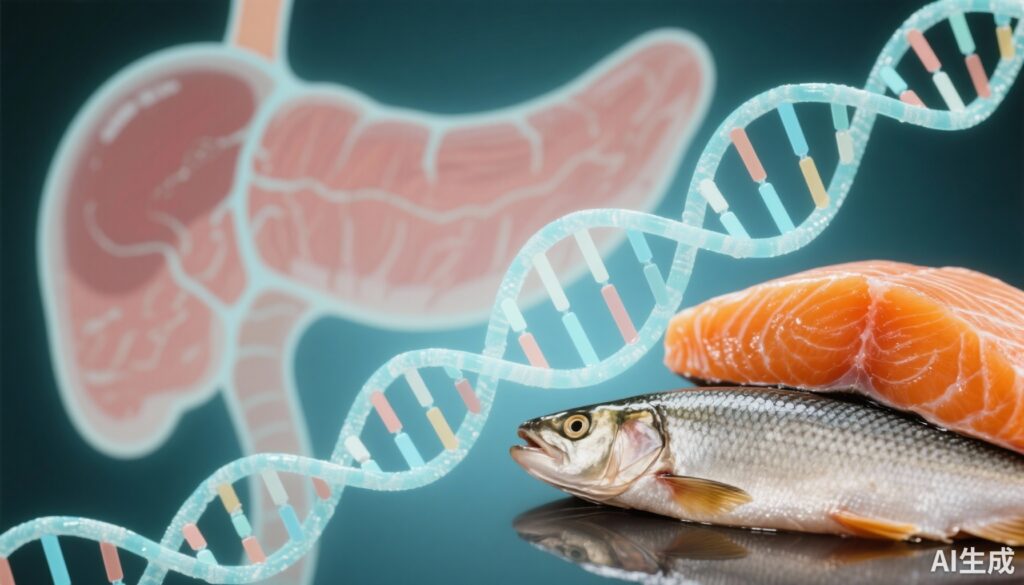Background
Pancreatic diseases, encompassing acute pancreatitis, chronic pancreatitis, and pancreatic cancer, represent serious clinical challenges due to often late diagnosis and poor prognosis, especially in pancreatic cancer. Worldwide, pancreatic cancer remains one of the most lethal malignancies, with limited effective preventive strategies. Diet, a modifiable lifestyle factor, has long been hypothesized to influence pancreatic disease risk. However, conventional observational studies have struggled to establish clear causal links owing to confounding variables and reverse causation. Oily fish, rich in omega-3 polyunsaturated fatty acids known for anti-inflammatory and cardioprotective effects, has generally been considered beneficial for health. Yet, its relationship with pancreatic cancer risk remains unclear and controversial, necessitating robust, causal inference methods to guide clinical and public health recommendations.
Study Design
The referenced study utilized a two-sample Mendelian randomization (MR) approach, leveraging genetic variants robustly associated with dietary intake traits as instrumental variables (IVs). This methodology capitalizes on random inheritance of alleles to reduce confounding and infer causal effects of exposures on diseases.
Genetic association data for 26 dietary components, including oily fish intake, were drawn from the UK Biobank cohort, comprising a large, ethnically homogenous population with comprehensive dietary questionnaires and genotyping. Outcome data were obtained from the FinnGen consortium, which provides well-powered genetic association datasets for pancreatic diseases, including pancreatic cancer. Meta-analyses consolidated evidence across datasets, while multivariable MR (MVMR) analyses assessed the independence of observed dietary effects.
Key Findings: Oily Fish Intake and Pancreatic Cancer Risk
One of the notable findings was that genetically predicted higher oily fish intake was associated with an increased risk of pancreatic cancer, with an odds ratio (OR) of 1.699 (p = 0.046). This implies that individuals with genetic variants predisposing to higher consumption of oily fish had approximately a 70% higher risk of developing pancreatic cancer compared to those without such predisposition.
This association contrasts the traditional view of oily fish as universally beneficial and raises important questions regarding the underlying mechanisms and clinical implications. Other dietary factors revealed protective effects (e.g., dried fruit intake was linked to a significantly lower risk of both acute and chronic pancreatitis), and some unexpectedly increased risks (e.g., red wine and bread increased acute pancreatitis risk, pork increased chronic pancreatitis risk). The independent association of oily fish intake with pancreatic cancer was robust even after adjusting for other dietary factors in MVMR models.
Expert Commentary
The finding of increased pancreatic cancer risk with oily fish intake is intriguing and somewhat counterintuitive, requiring cautious interpretation. Biological plausibility may involve oxidative metabolites derived from polyunsaturated fatty acids, potential contaminants such as persistent organic pollutants bioaccumulated in oily fish, or complex interactions with pancreatic metabolism.
Experts emphasize the strengths of Mendelian randomization in mitigating confounding but note that residual pleiotropy, limited generalizability beyond European populations, and the nature of the dietary exposure proxy (frequency vs. quantity, preparation method) may influence results.
Further mechanistic studies are warranted to understand whether specific components in oily fish contribute to pancreatic carcinogenesis or whether genetic variants used as IVs influence other pathways impacting risk. Meanwhile, these results highlight the importance of personalized dietary recommendations and caution against generalizing presumed health benefits without rigorous evaluation.
Conclusion
This MR study challenges commonly held perceptions that oily fish universally reduce chronic disease risk by identifying a positive causal association between oily fish intake and pancreatic cancer susceptibility. Combined with evidence on other dietary factors, these findings underscore the complex role nutrition plays in pancreatic disease pathogenesis.
Clinicians and public health practitioners should recognize that diet-pancreatic cancer relationships are multifaceted and that preventive strategies may require refinement incorporating genetic insights and risk stratification. Future research should validate these findings in diverse populations, elucidate mechanistic pathways, and explore how dietary guidance can optimally integrate such genetic evidence to reduce pancreatic cancer incidence effectively.
Reference
Zhang Q, Yu S, Gao D, Gong J. Associations between dietary intake and pancreatic disease: a mendelian randomization study. Int J Surg. 2025 Sep 24. doi: 10.1097/JS9.0000000000003527. Epub ahead of print. PMID: 40990651.




so much fantastic information on here, : D.